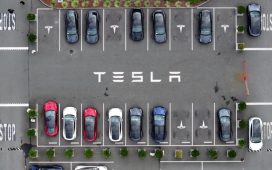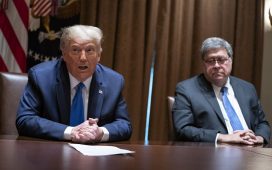WASHINGTON — President Joe Biden pledged support for a bipartisan infrastructure framework that would uphold his goal of building 500,000 electric vehicle charging stations nationwide while slashing the funding allotted to do so.
The $1.2 trillion agreement was unveiled Thursday by the White House after the president and Vice President Kamala Harris met with a bipartisan group of 10 senators, including Democrat Joe Manchin of West Virginia and Republican Rob Portman of Ohio.
The plan, which likely faces a challenge from lawmakers on both sides of the aisle, would provide $7.5 billion to build a national EV charging network along highways and in rural and disadvantaged communities, according to a White House fact sheet on the agreement. It also would provide $7.5 billion to electrify thousands of school and transit buses and boost domestic manufacturing of zero-emission vehicles and parts.
Biden had previously called for $174 billion to boost EVs, including a reported $100 billion in consumer rebates and $15 billion to build 500,000 EV charging stations nationwide, as outlined in the $2 trillion American Jobs Plan unveiled in March.
The group of senators, who had been negotiating between themselves and with the White House for weeks, “has come together to forge an agreement that will create millions of American jobs and modernize our American infrastructure,” Biden said at the White House.
He called the investments “long overdue” and said that “this agreement signals to the world that we can function, deliver and do significant things.” He also said it was a “huge day for half of my economic agenda.”
The bipartisan legislation is expected to move through Congress alongside a separate bill that would spend trillions more on what Biden called “human infrastructure” that the GOP opposes.
House Speaker Nancy Pelosi said earlier that her chamber wouldn’t consider the bipartisan deal without the broader package of legislation, which Democrats will attempt to pass using the so-called budget reconciliation procedure that avoids a Republican filibuster in the Senate. Biden said he would only sign the bipartisan deal if it comes to his desk together with the reconciliation bill.
The senators – five Republicans and five Democrats – hammered out the final agreement in the last several days, with top White House aides including Biden counselor Steve Ricchetti and National Economic Council Director Brian Deese shuttling to Capitol Hill to participate in the talks.
“We didn’t get everything we wanted. But we came up with a good compromise,” Republican Senator Rob Portman said after meeting with Biden.
Senator Kyrsten Sinema, an Arizona Democrat who led the group of senators with Portman, said that “we all gave some to get some.”
Besides the EV chargers, the legislation would finance a range of programs, including the largest investment in public transit in U.S. history, repairs to roads and bridges, the elimination of lead service lines in the nation’s water systems, expansions of broadband internet service, cleaning up pollution and new, “resilient” power lines.
The cost of the expenditures would be offset by a variety of revenue-raising provisions, including stronger enforcement of tax collections from the wealthy, sales from the Strategic Petroleum Reserve, unspecified “public-private partnerships” and assumptions that the infrastructure investments would lead to greater economic growth.
“The president came into office promising to find common ground to get things done – and he’s delivering on that promise,” the White House said.
The agreement marks a significant step forward in the effort to put together a package of infrastructure spending that can draw enough votes from both parties to get through Congress. But in addition to receiving Biden’s backing, the senators now must get congressional leaders of both parties on board to assure support in the evenly divided Senate, where 60 votes will be needed to get the legislation passed under regular order.
Before going to the White House, Portman met Thursday with Senate GOP leader Mitch McConnell to brief him on the proposal and lobby for his support. “He hasn’t made his decision,” Portman said afterward.
Success also will hinge on whether Biden can assure progressive Democrats in the House and Senate that their priorities are met in a separate, more expansive package that would use the fast-track procedure known as reconciliation to clear the Senate without needing GOP votes. The White House argues that a bipartisan plan unlocks moderate Democratic support for more social spending in a later bill.
Pelosi and Senate Majority Leader Chuck Schumer said they’ve agreed on a strategy to twin a bipartisan infrastructure package and a budget resolution setting up fast-track legislation with the rest of Biden’s $4 trillion economic plan. Votes could come in July.
But Pelosi suggested the House will hold back until the broader reconciliation package is cleared through the Senate. That likely would push final passage of both past July, into a curtailed August recess or beyond.
“Let me be really clear on this: we will not take up a bill in the House until the Senate passes the bipartisan bill and a reconciliation bill,” Pelosi said Thursday at a news conference.
Pelosi can afford to lose no more than four Democratic votes, and progressives are wary of moving ahead on an infrastructure bill without a guarantee that the larger package will get voted on.
“We don’t have a lot of faith in, ‘I promise I’ll do this,’” Representative Pramila Jayapal, head of the Congressional Progressive Caucus, said Wednesday.
Democratic Senator Ron Wyden said the infrastructure proposal is too narrow.
“We cannot throw priorities like climate, prescription drugs and tax fairness overboard,” he said, adding that passage of the infrastructure legislation has to be “directly connected” to a bigger reconciliation bill that addresses those issues.
One of the key moderate Democrats and a member of the bipartisan group that worked on the infrastructure plan, West Virginia Senator Joe Manchin, urged progressives to support the deal: “I would say please don’t let the perfect be the enemy of the good.”
Audrey LaForest and Bloomberg contributed to this report.







